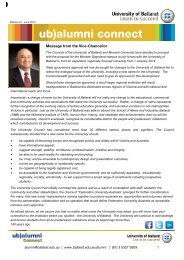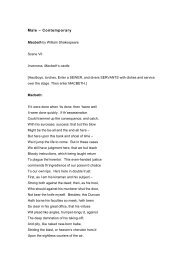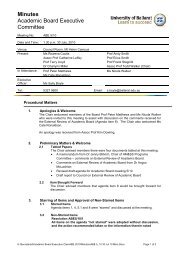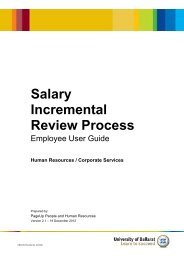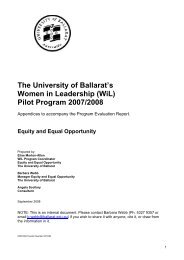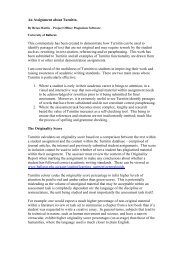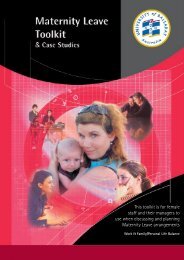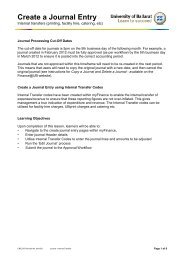Policy without (much) pain - University of Ballarat
Policy without (much) pain - University of Ballarat
Policy without (much) pain - University of Ballarat
- No tags were found...
Create successful ePaper yourself
Turn your PDF publications into a flip-book with our unique Google optimized e-Paper software.
<strong>Policy</strong> <strong>without</strong> (<strong>much</strong>) <strong>pain</strong>20. ComplianceThe term compliance has, inevitably, an authoritarian ring. Yet if some <strong>of</strong> the main purposes <strong>of</strong>policy are to manage risk and achieve institutional strategy, it is highly desirable that staff complywith policy. In many areas, such as equal opportunity, financial accounting, higher educationfunding, occupational health and safety, privacy and taxation, the institution is itself required bylaw to comply with legislation. It is therefore very important to know whether policies are beingcomplied with, and if not, why not.The question <strong>of</strong> how compliance will be managed should be addressed early in the project todevelop a new policy. What evidence can be used to assess compliance should be discussed.Use <strong>of</strong> information technology systems and other processes to record compliance should beconsidered in the planning, research and consultation phases <strong>of</strong> the project. The frequency <strong>of</strong>compliance checking will vary depending on the policy area and the potential risk involved in noncompliance.At a minimum, complianceMonitoring compliance withpolicy … should beapproached in a spirit <strong>of</strong>collegial support rather thanone <strong>of</strong> policing.checking should be part <strong>of</strong> the policy reviewprocess.Who is responsible for compliance will varydepending on the policy area and whethercompliance is an external regulatoryrequirement, or an internal quality assuranceprocess. In all cases monitoring compliancewith policy is a challenging part <strong>of</strong> the policymanager’s work. It should be approached in a spirit <strong>of</strong> collegial support rather than one <strong>of</strong>policing. If units are not complying with policies, the reasons are likely to be inadequate changemanagement at the time the policy was implemented, operational difficulties with complianceand/or lack <strong>of</strong> resources. If approached in a helpful spirit, managers <strong>of</strong> non-compliant units aregenerally willing to acknowledge their non-compliance, explain the reasons for it and discussoptions for their unit to achieve compliance.This is valuable feedback on how the policy is playing out in practice. It may lead to additionalchange management activities to support the unit in changing processes, and/or adjustments tothe policy and supporting systems and processes, to match operational practicalities better. Ifneither <strong>of</strong> these can resolve the non-compliance, it can be made visible to senior managers~ 40 ~



